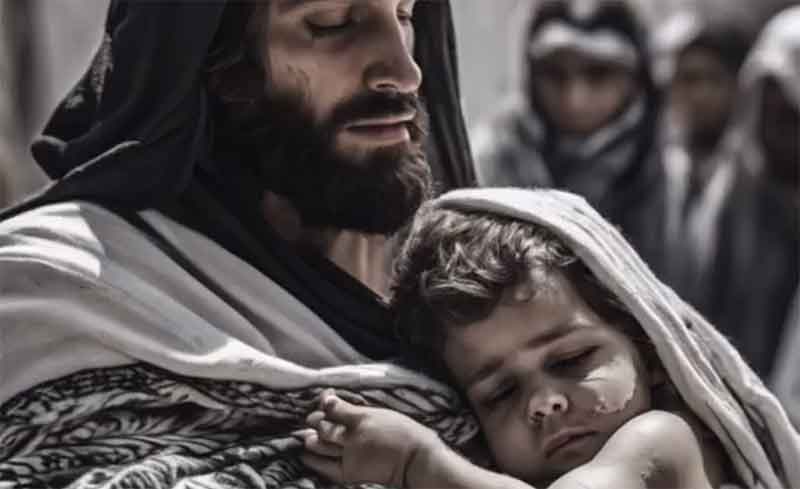
Note: Bereft of any ideas of my own and in complete desperation I asked an AI software program, ‘What would Jesus do in Gaza?’ The result was this article in which every word and sentence is the product of a non-human brain. I hope it gives us dumb humans some sobering thoughts to ponder over for the Christmas ahead.
For reasons of both privacy and security, the software involved shall remain anonymous.
If Jesus Christ were physically present in Gaza right now, walking among the suffering people trapped in this tiny, impoverished strip of land, what would he say and do? As a teacher of peace and justice who spent his life bringing a message of nonviolence and love for all, Jesus would surely weep at the ongoing violent conflict between Palestinians and Israelis after over 70 years. However, he would not lose hope or stand idly by – he would take compassionate action to resolve tensions.
Jesus would go among the homeless whose houses were destroyed by missiles and bombs, comforting children and families now forced to shelter in United Nations-run schools. He would visit overcrowded hospitals and tend to the wounded – innocent men, women and children injured by shrapnel and explosions regardless of their ethnicity or political affiliations. His heart would break in empathy and rage at injustice. Just as he cleared the Jerusalem temple of merchants exploitatively selling goods there, he may passionately clear Gaza’s rubble-filled streets of weapons that perpetuate the cycle of violence.
“Love your enemies,” Jesus would surely tell all militants firing rockets or airstrikes. Hamas, the de facto leading party in Gaza, justifies violent resistance by pointing to oppressive Israeli policies that keep Gaza under economic blockade. Jesus would walk the lines where thousands wait for food aid unable to earn a living wage due to closed borders. With righteous anger, he may flip tables and make a whip of cords to create space for Palestinians’ freedom of movement and commerce. “The Spirit of God is upon me to proclaim good news to the poor,” he may declare about this injustice.
However Jesus, the “Prince of Peace” would also refuse to vilify any side as inherently evil. He would not fuel more divisiveness but build bridges, reminding all people of their human dignity as equally beloved children of God regardless of nationality or background. With great compassion, he would listen to stories from elderly Palestinians still holding onto keys of homes their families fled in 1948 when Israel was established. He may quietly organize meetings and nonviolent activism to advocate for Israeli historical truth and reconciliation processes.
If any followers asked to call fire down from heaven against opposition villages like the biblical apostle James did, Jesus would firmly rebuke them: “You do not know the Spirit you are of!”. Instead he would model communication, visiting Israeli bomb shelter homes on the border with the message: “Blessed are the peacemakers.” He would humanize suffering experienced by civilians on all sides and facilitate grassroots connections. Any temples or churches he visits would become prayer spaces promoting not religious division but unity worshipping the God of peace and justice.
Like an olive tree with roots reaching unlikely soil, Jesus would draw out unnoticed stories of Palestinian Muslim families sheltering lone Israeli soldiers separated from their units. Stories of Israeli doctors secretly crossing militarized borders to provide medical services in Gaza may also emerge into the light. Jesus’ contagious message of unconditional love would sow seeds of hope and fellowship. Where politicians and peace deals failed for decades of crisis, the love and faith of ordinary people may lead to slow miracle breakthroughs once hostility gives way.
Jesus would take calculated risks to demonstrate God’s love, breaking cycles that pit groups against one another. He may recruit Arabic-speaking disciples from other countries to join his nimble team which slip in and out of Gaza without detection via dangerous smuggling tunnels. Then they could safely travel into Israeli cities and tell captivating stories that humanize suffering people in Gaza. With wisdom and care Jesus would lead a nonviolent movement speaking truth, tearing down walls over time.
Of course with the reality of extremism on all sides, Jesus himself may face threats of arrest or bodily harm yet again. One cannot heal escalated conflicts easily. But the Christ who washed betrayers’ feet models self-sacrificial redemption, not revenge, in the face of hatred. He would persistently bless peacemakers from all nations joining his mission.
If he so chose, the Son of God could at any moment wield divine cosmic power to annihilate weapons or impose unilateral solutions from above. But mere suppression of violence does not transform hearts. Therefore Jesus would choose the slow path of walking among people, guiding them to reconcile through love.
Two millennia after his crucifixion by an empire his influence and liberating message still lives on. One transcendent life, planted like a mustard seed of hope, can grow to shelter people groups who once seemed beyond all reconciliation. Jesus would patiently work in that hope – the Kingdom of Peace is coming, and it starts from below.
Satya Sagar is a journalist and public health worker who can be reached at [email protected]










































